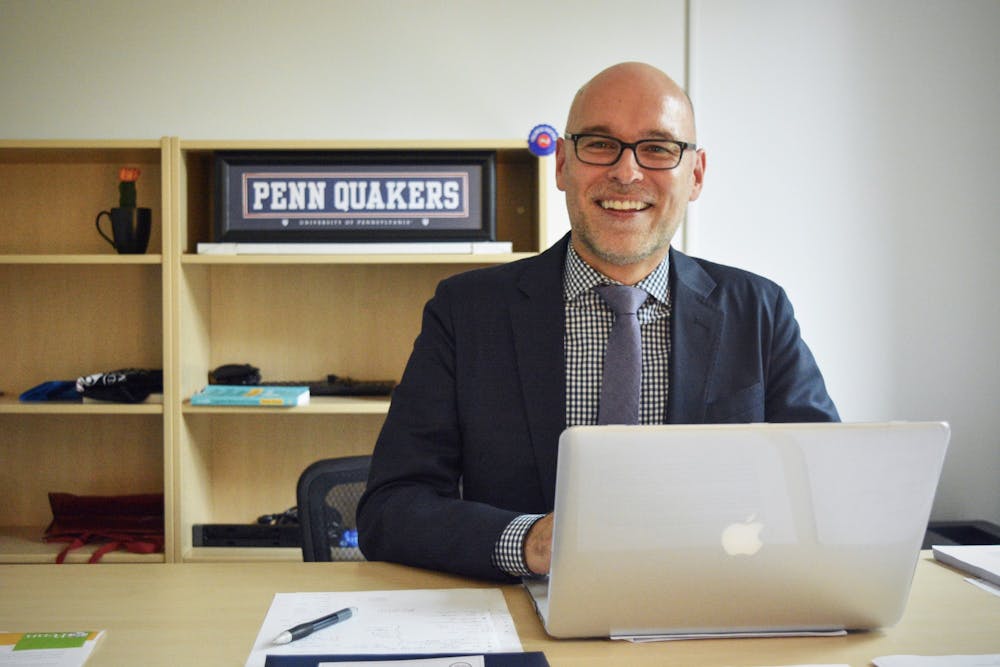
The Daily Pennsylvanian spoke with Penn's Chief Wellness Officer Benoit Dubé and Director of Campus Health Ashlee Halbritter following Penn's June 25 announcement that the fall semester will be conducted in a hybrid format, with students on campus.
Dubé and Halbritter discussed health and safety initiatives for bringing students back to campus, including the Student Campus Compact, and emphasized that many specifics of Penn's plan remain fluid.
Here are the five main takeaways from the conversation.
1. The decision is subject to change, and prioritizes individual choices.
Dubé said Penn's decision to welcome students back to campus is "not immutable" and may change over time, especially as case counts have been rising across the nation over the past days.
"This decision can change over time, but we had to make an announcement and start planning for something. It would have been irresponsible not to. The decision may change in the future, but that also means that the ways students feel about returning to campus may also change," Dubé said.
He said that in a worst-case scenario, Penn may not be able to invite any students back to campus, particularly if case counts continue to rise.
Dubé also said the hybrid education model was chosen in an effort to offer students the most flexibility and to make the best decision for themselves.
"This plan is not meant to be an imposition on anyone; it is about offering options and opportunities for people to make the best decisions for themselves, including students and faculty," he said.
2. Quarantine will be enforced by the student.
Halbritter said when it comes to quarantining, students will be able to make decisions themselves. Students exposed to the virus will be asked, but not forced, to quarantine.
"If you've had an exposure, and we're not sure if you're going to convert to a positive case, but we know you have been exposed, it is for the safety of the community that you choose to stay at home," Halbritter said.
Dubé said that if students do test positive for COVID-19, those who live in on-campus housing will be moved to the isolation facility in Sansom Place West. For those who live in off-campus housing, students will be asked to isolate to their individual bedrooms and ask roommates and friends to drop off food outside their door.
3. Contact tracing will be done through an app, likely called PennOpen.
"We are currently pilot testing the apps that we're working on, and they have been piloted with some of the staff who have resumed research on campus," Halbritter said.
Dubé said the app will be used for students to monitor themselves on their own schedules, and that the location-tracking ability used for contact tracing is completely private.
"I would say [the app is] very private, it's on your phone. And if you don't tell us what the app says, then we won't know. We're putting this there so that we can be more efficient in identifying and quarantining possible cases. There's nothing Big Brother about it. It's just kind of like a geeky way to make contact tracing more effective," he said.
The name of the app and many of its specific features are still unconfirmed.
4. The 'Student Campus Compact' is not a contract.
Dubé and Halbritter said the Student Campus Compact is being put in place as a series of expectations for student behavior.
"It's called a compact because it really is meant to crystalize our collective responsibility to look out for one another. But it's spelled out in very concrete specific expectations about how we will be able to look out for one another, by abiding by new rules," Dubé said.
Dubé said Penn's ability to monitor if students are following the Compact will generally be on the honor system without strict University oversight.
Dubé said, however, that the University will create a Compact Review Panel, a team of public health experts who will look at the circumstances of people straying away from the expectations in the compact. The panel will have the authority to enforce consequences as needed, he said.
"We're not going to have anybody policing this, but there must be consequences if people stray. If you come to campus and you endanger the lives of others, then you can't be on campus," he said.
Dubé emphasized that while a consequence system is necessary, the idea of the Compact is a collective agreement to keep the Penn community safe. Penn's campus will not be a "police-state," he said.
5. Penn is promising to do its best, and only that.
Even with the plan to test all students for COVID-19 as soon as they arrive on campus, Dubé said there will likely still be cases within the Penn community. He emphasized that students will inadvertently bring the virus to campus and may spread it.
Dubé said that while Penn cannot promise no one will get the virus, as students will inadvertently bring the virus to campus and the campus is located in a large city, the University promises to "move in swiftly and effectively to prevent any further transmissions."
"This is not about vilifying anyone. This is an invisible enemy. We are all vulnerable to it. All we are promising is to do our best," he said.
The Daily Pennsylvanian is an independent, student-run newspaper. Please consider making a donation to support the coverage that shapes the University. Your generosity ensures a future of strong journalism at Penn.
Donate






